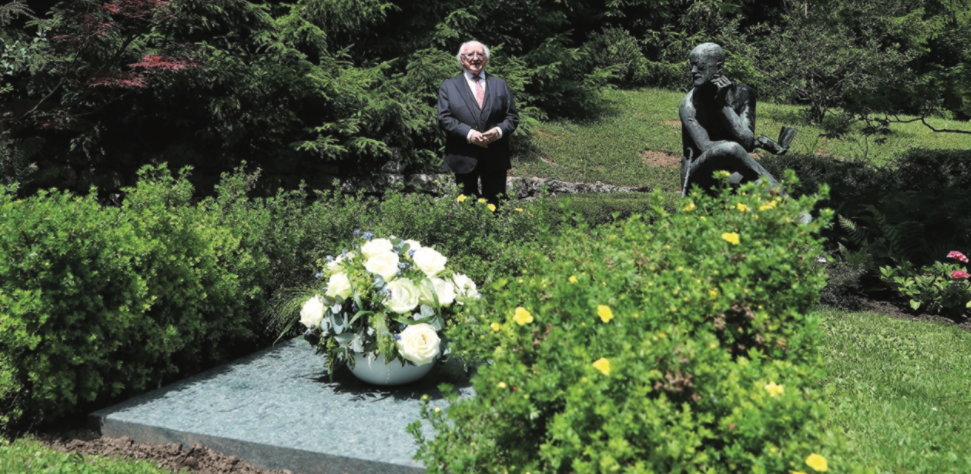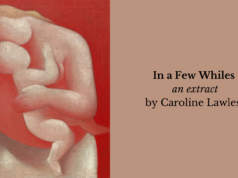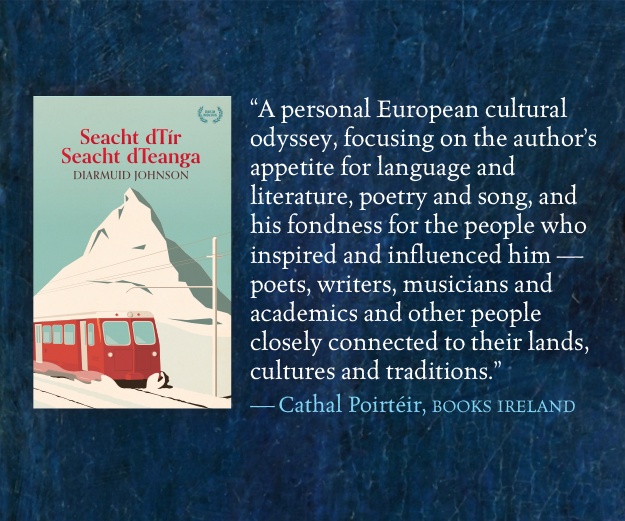
Anthony J. Jordan examines the failed attempts to repatriate James Joyce’s body
ARCHIVE: First published June 2019 Books Ireland issue #385.
Bloomsday, 16 June, is now a major celebration in Ireland. It is unusual in being a public holiday with no official sanction but grew from a small event organised by James Joyce enthusiasts to the point where it is now a major global event that is celebrated across the world. Joyce, however, was not always in favour with the Irish establishment and even after independence, Ireland was reluctant to acknowledge the significance of Joyce or to embrace his legacy. Even in death he remained out of favour and was shunned by the Irish politicians. Attempts to return his body to Ireland were thwarted by the government of the day.
President Michael D. Higgins paid a historic visit James Joyce’s grave in Fluntern Cemetery, Zurich, on 8 June 2018. He thanked the Zurich authorities for maintaining the grave. One week later at a Bloomsday event in Áras an Uachtaráin, President Higgins described the 16 June as the most important day on Ireland’s cultural calendar, and said: ‘Bloomsday remains a day when we have the opportunity to celebrate the genius of James Joyce and his legacy to us. We must never forget on Bloomsday the person,
the family and the sacrifice that gave us the ground-breaking literary inheritance that is celebrated all over the world. Ireland owes a debt to James Joyce.’ Those words illuminate how much Ireland has moved on, as the official attitude to Joyce was not always so generous.
James Joyce’s strategy was to write as an exile from Ireland. That it followed him into eternity was not part of the plan. Since his death in 1941, there were periodic hopes that his body would be repatriated, like that of W.B. Yeats in 1948. But his widow Nora Barnacle’s vain attempts were thwarted by Irish governments in 1941 and again in 1948– 9. On hearing of Joyce’s death on 13 January 1941, the Secretary of the Department of External Affairs, Joseph Walshe, contacted the chargé d’affaires in Berne, Francis Cremmins, asking ‘Did he die a Catholic?’ while instructing him not to attend the funeral. Eamon de Valera, who was Minister of External Affairs as well as Taoiseach, was no more sympathetic to Joyce. Repatriation of his body was off the agenda it seems because he had offended too many politicians and priests.
The historical importance of recognising Catholicism as the defining characteristic of Irish nationality was reinforced by Ireland’s first Coalition government, an alliance of 1948–51. At the insistence of Seán MacBride, Minister of External Affairs, the following telegram was sent to the pope: ‘On the occasion of our assumption of office and our first cabinet meeting, my colleagues and myself desire to repose at the feet of Your Holiness the assurance of our filial loyalty and devotion as well as our firm resolve to be guided in all our work by the teaching of Christ and to strive for the attainment of a social order in Ireland based on Christian principles. John A. Costello. Prime Minister.’
The repatriation of W.B. Yeats in September 1948 raised Nora Barnacle’s hopes that her husband might also be repatriated. An American diplomat and bibliophile, John Jermain Slocum, paid a courtesy call in June 1948 on President Seán T. O’Kelly while on a tour of Europe. He met Nora Barnacle in Zurich and she told him that she was anxious to have her husband’s remains returned to Ireland. Once back in America, Slocum wrote directly to the Irish president,
sounding him out on the possibility of repatriation: ‘I do not think that I or anyone else could ask for a definite answer, but if you were to express to me even a belief that such a return of his body to Ireland was possible, I think that I could start his friends in Zurich, in Paris, in London, in New York and even in Dublin, working on it wholeheartedly’. He asserted that an article in the Vatican newspaper, Osservatore Romano, in 1937, was ‘evidence that the Church itself recognizes Joyce’s contribution to the tradition of Catholic letters’. He never got a reply to his letter, however.
As Minister of External Affairs, Seán MacBride had played a vital part in the repatriation of Yeats on behalf of his mother Maud Gonne and the Yeats family. But neither he nor his mother felt any sympathy towards James Joyce. Joyce had mocked her and her husband, Major John MacBride, referring to them as Joan of Arc and Pope Pius X. When Joyce had called to Maud Gonne’s Parisian home seeking assistance, she was unable to receive him. He took umbrage at this and despite receiving a letter of explanation inviting him to return, he told his own mother that he would not. When the issue of repatriation came before John A. Costello’s government on 15 July 1949, Seán MacBride refused to support it. A note on the file says ‘No action’. The historic visit of President Higgins to Joyce’s grave and his speech on Bloomsday indicate that official Ireland’s attitude has changed.
Arguably power is at its most effective and most insidious when we become convinced that there are no better ways of doing things, that ‘this Ireland’ is as good as it gets or that everything worth thinking and doing has already been tried and tested. After Ireland’s economic collapse in 2008 it became commonplace that everyone was implicated in and morally culpable for the excesses of the Celtic Tiger. While serving as a convenient rationale for the austerity that followed, this refrain denied expressions of culture, politics and community that had contested the neoliberal orthodoxies of the Tiger era. While there was a dominant version of what Ireland was or could be, there were always countervailing, oppositional voices; they, however, typically lacked audiences or recognition in the public sphere.
Bearing this in mind, the Síreacht series creates a platform for exciting, critical and alternative perspectives on Ireland. Launched in 2018 by Cork University Press, the series responds to real social, cultural, environmental and economic questions but does so in ways that contest and transcend prevailing assumptions or conventional ways of thinking. The books reflect a grounded utopian spirit that recognises the seeds of better futures in the present.
***
Anthony J. Jordan is the author of Maud Gonne’s Men (Westport Books).











